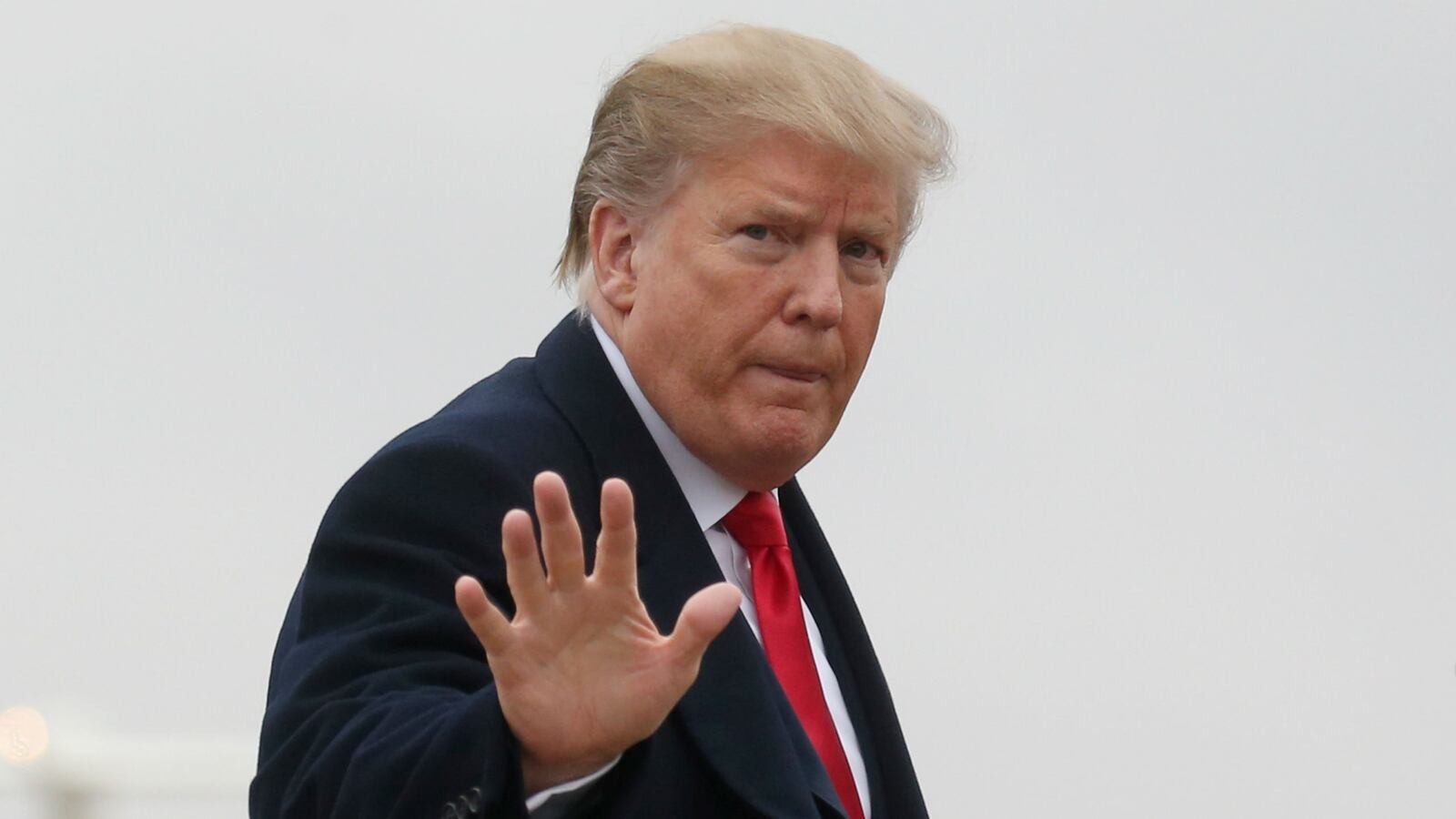Nearly three years after hacked materials upended the 2016 presidential campaign, every Democratic candidate running for the White House has pledged not to knowingly use such material should they end up being published during the current election cycle.
Only one 2020 campaign declined to make such a commitment: President Donald Trump’s.
The Daily Beast asked each presidential campaign either up-and-running or in its exploratory phase whether they would commit to not knowingly using or referencing hacked material that appears online on grounds that it may have been obtained illegally.
Each Democratic candidate responded with some form of commitment to not used hacked materials. Sen. Kirsten Gillibrand’s (D-N.Y.) team issued a statement in the senator’s name in which she stressed that both campaigns and members of the media needed to “learn serious lessons from their cyber attack on our election systems in 2016.”
"For my part,” Gillibrand added, “I vow that our campaign will not seek out stolen hacked information from foreign adversaries or knowingly weaponize or promote stolen hacked materials, and I urge all of my colleagues in the 2020 field to pledge the same."
Josh Orton, a top adviser to Sen. Bernie Sanders (I-VT), said that the senator “believes the American people want an issue-based campaign,” while adding, “We would not use stolen material to attack another candidate."
Jeff Giertz, a spokesman for Senator Cory Booker’s (D-NJ) campaign said that, "Unlike Donald Trump who welcomed and encouraged election interference from a foreign adversary, our campaign condemns the use for political gain of information or material obtained by illegal means.”
Kristen Orthman, a top aide to Sen. Elizabeth Warren (D-MA), said the Massachusetts Democrat would commit to not using materials obtained by illegal means. So too did Ian Sams, a spokesman for Sen. Kamala Harris’(D-CA) campaign and Lis Smith, a top adviser to Mayor Pete Buttigieg.
Jennifer Fiore, a senior adviser for Julian Castro’s campaign said that, “Without question, Julián Castro's campaign would never knowingly use or reference material that [was] obtained through illegal means.”
Erika Tsuji, a spokerson for Rep. Tulsi Gabbard’s (D-HI) campaign, said, “Tulsi commits to not using hacked materials on competitors, and calls upon other candidates who are running to make the same commitment.”
Lis Smith, communications adviser to Mayor Pete Buttigieg’s campaign, told The Daily Beast that the candidate “will not use” any hacked materials against fellow candidates.
“Our campaign will not knowingly use hacked materials that have been obtained illegally,” a spokesman for Sen. Amy Klobuchar’s (D-MN) said.
An aide to former Starbucks CEO Howard Schultz, who is mulling an independent presidential bid, said that, “if we were to become a campaign we would follow that rule.”
Numerous attempts to obtain comment from the Trump campaign were not returned. But after publication, Kayleigh McEnany, the Trump campaign's national press secretary, sent the following note: “We’re not in the business of taking pledges invented by the liberal online media."
The remarks from the field of Democratic candidates and Schultz reflect the acute sensitivity and fear that many operatives have about the possibility of a rerun of the last presidential election.
In the spring of 2016, hackers within Russia’s military intelligence directorate, the GRU, looted more than 44,000 emails and 17,000 attachments from the internal network of the Democratic National Committee, and separately stole another 20,000 emails from Clinton campaign chief John Podesta.
Posing as a notional Romanian hacker called “Guccifer 2.0,” the Russians passed the material to WikiLeaks’ Julian Assange, who released them at strategic intervals in the 2016 campaign.
WikiLeaks published the first half of the DNC emails three days before the Democratic National Convention in Philadelphia. On Oct. 7, Trump’s raunchy Access Hollywood tape went public and quickly dominated the news cycle, until Assange published the stolen Podesta emails one hour later.
He saved the second half of the DNC heist until Nov. 6, dumping them two days before the election. Trump turned to the stolen material again and again on the stump. “WikiLeaks, I love WikiLeaks,” he declared at an Oct. 10, 2016 rally in Wilkes-Barre, Pennsylvania. Four days later in Charlotte, North Carolina, the then-candidate declared: “The Hillary Clinton documents released by WikiLeaks make it more clear than ever just how much is at stake come November 8.” NBC reporters found that Trump had referenced WikiLeaks 145 times in the final month of the campaign.
In the aftermath of that episode, efforts were made between the two major political parties to strike a pact that would effectively bind them from weaponizing stolen or hacked content again. But those conversations never culminated in an actual agreement. The Democratic Congressional Campaign Committee and the National Republican Campaign Committee came close in the 2018 cycle. But talks broke down after the NRCC balked at the idea that they or their candidates couldn’t reference or highlight press reports that were based on materials that had been hacked. The committee’s logic was that it would be virtually impossible to simply not acknowledge information that was already in the public domain.
It remains to be seen if the Democratic candidates who have made pledges not to knowingly use hacked materials will also balk at not referencing press reports based on those materials. Aides who spoke to The Daily Beast said there had not been back-channel conversations about forming some larger pact. But they also noted that the campaign had just begun.
To date, there has been no apparent hacking of any candidate or campaign running in 2020. But Russian hackers did target candidates in the midterm cycle and the fear among operatives and cybersecurity experts is that the same pattern will hold true in this election.
With reporting by Kevin Poulsen and Sam Brodey







